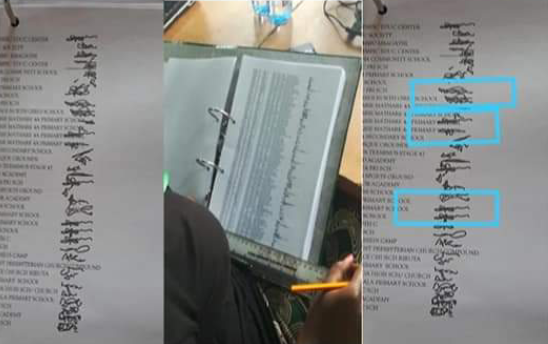ELOG Query IEBC Over Punguza Mizigo Signatures

On 18th July 2019, Independent Electoral and Boundaries Commission (IEBC) confirmed that they had verified the signatures submitted by the Thirdway Alliance Kenya Party for the proposed Punguza Mizigo ‘referendum. The signatures were delivered to the Commission together with a draft Constitutional Amendment Bill and details of supporters of the draft Bill both in soft and hard copy.
The verification exercise is in compliance with Article 257 (4) of the Constitution of Kenya, 2010, which requires the Initiative to be supported by at least one million registered voters.
According to IEBC, the Initiative was supported by 𝟭,𝟮𝟮2,𝟱𝟰𝟭 registered voters. Therefore it met the requisite threshold.
Election Observation Group (ELOG) however released a preliminary statement on the verification process which they participated in as observers. According to ELOG, the verification process had many faults as listed below.
A Summary of Observation Findings.
- Uniformity of significant number of signatures found in filled forms: ELOG observed that some of the signatures that had been appended against individuals’ names were conspicuously uniform raising the question of authenticity and reliability of the signed forms in question.
- Lack of signature repository: Since IEBC had no repository of specimen signature (like the banks do), there was no way to compare and verify the same.
- ELOG also noted that despite heavy investment by IEBC to have voters being registered using their biometrics, both the petition and subsequently the verification process did not benefit from this opportunity.
- Duplication of ID numbers: ELOG observed that there were cases of names that shared the same ID numbers.
- Missing details: ELOG observed that some of the forms submitted for verification lacked details such as ID nos. and signatures.
- Failure by IEBC to make public the names and signatures: ELOG faulted the fact that Kenyans were not given an opportunity to ascertain if in deed the said signatures were given with their consent.
- Delay in funding for the verification exercise: ELOG noted that IEBC had no funds set aside for it to carry out this exercise and had to appeal to get it.
A Summary of Recommendations by ELOG
- Open Data and Public participation: In the absence of a repository of signatures, IEBC should publish the list of names in the Kenya gazette or in any other public medium, in compliance with open data principles, so that those whose details are captured in the forms can confirm that they consented to the petition. This is a critical issue that would further authenticate the process, enhance transparency and avoid unnecessary litigation.
- Fast track the enactment of a referendum regime: While ELOG notes that a Referendum Bill, 2019 has already been developed to operationalize Art 257; it has never been tabled in Parliament. In the absence of a standalone statute on Referendum, the Commission has been relying on Part V of the Elections Act, 2011 that provide for the conduct of Referendum. These provisions are still inadequate to support the entire referendum process.
- Establishment of Electoral Fund: ELOG notes that IEBC’s lack of independent Fund continues to hamper its operations and processes and therefore proposes that an independent fund, similar to the Political Parties Fund, be established to give the Commission independence and autonomy in budgeting and execution of its mandate.
On the existing electoral environment ELOG notes that:
- IEBC has continued to operate without the full constitution of the commission since the resignation of 4 of its 7 commissioners despite clear provisions of the law.
- A number of electoral reform processes are simultaneously being undertaken by different actors including Parliament, the BBI, CSO and faith-based organization initiatives and now through the Punguza Mizigo process. ELOG proposes that Parliament takes a leadership role towards harmonizing all these processes so that the people can have clarity on the issues being canvassed for effective participation and decision-making.
IEBC published the list of Punguza Mizigo Initiative Supporters and shared a Press statement as a response to ELOG.
What journalists can do
- Go through the two claims by IEBC and ELOG and educate the public on the legal procedure for the proposed referendum.
- Have a background article that compares how things have been done before. A good example would be comparing Punguza Mizigo Initiative with Okoa Kenya Initiative that was proposed by Orange Democratic Party (ODM) in 2016.